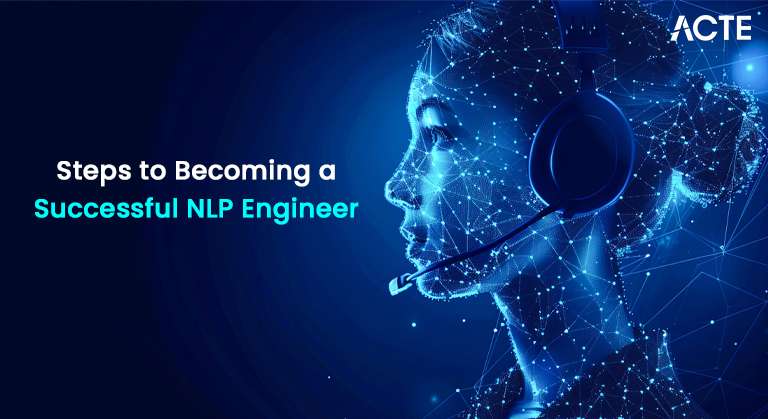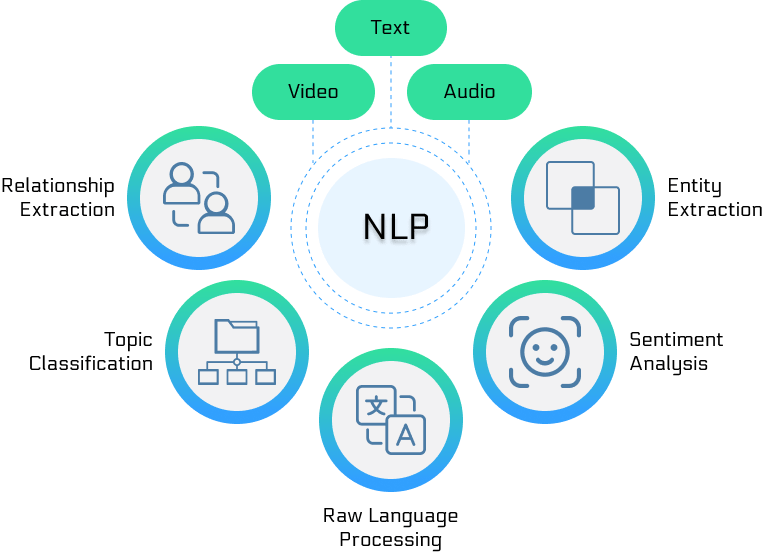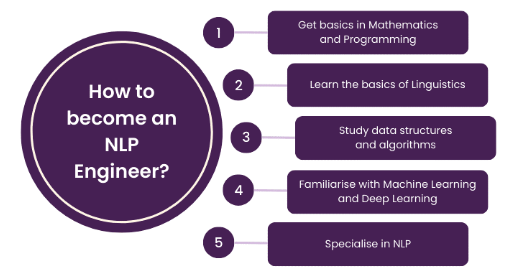
- NLP: What Is It?
- An NLP Engineer: Who Are They?
- Job Description for an NLP Engineer
- The Abilities Needed to Work as an NLP Engineer
- Guide to Becoming an NLP Engineer
- Jobs for NLP Engineers Are Available
- Pay for NLP Engineers in India and the USA
- Getting Started as an NLP Engineer
- Conclusion
Natural Language Processing (NLP) is a rapidly growing field within artificial intelligence (AI). NLP engineers are highly sought after for their ability to bridge the gap between human language and computer understanding. As technology continues to evolve, the demand for professionals who can create solutions that allow machines to interpret and interact with human language is increasing. Suppose you’re interested in becoming an NLP engineer. In that case, this guide will walk you through everything you need to know—from the basics of NLP to the skills and qualifications necessary to succeed in this exciting career path.
NLP: What is it?
Natural Language Processing (NLP) refers to computers’ ability to process and analyze human (natural) languages. It is a field at the intersection of linguistics, computer science, and artificial intelligence (AI) that deals with the interaction between computers and human languages. The primary goal of NLP is to enable machines to understand, interpret, and generate human language in a meaningful way. NLP applications are diverse, ranging from voice assistants like Siri and Alexa to text summarization, language translation, sentiment analysis, and even chatbots. For those looking to enter this cutting edge field, enrolling in Data science training can provide the necessary skills to leverage NLP techniques, analyze complex datasets, and develop intelligent systems that understand and respond to human language.
Interested in Obtaining Your NLP Certificate? View The NLP Online Course Offered By ACTE Right Now!
An NLP Engineer: Who Are They?
An NLP engineer is a specialist who builds and optimizes systems that enable machines to process and understand human language. The role of an NLP engineer requires a deep understanding of both linguistics (how language works) and computer science (how to implement algorithms that can process language). These engineers create algorithms, models, and software that analyze and interpret human language in various formats, including text, speech, and video. NLP engineers often work closely with data scientists, machine learning engineers, and linguists to design systems that can handle various language-based tasks. These tasks include automated translation, information extraction from unstructured data, and chatbot creation. Gaining hands-on experience through TensorFlow projects can help aspiring NLP engineers implement neural networks, experiment with deep learning models, and strengthen practical skills. The work of an NLP engineer plays a crucial role in advancing AI’s ability to interact with humans in a way that feels natural.

Job Description for an NLP Engineer
The primary responsibility of an NLP engineer is to develop systems that allow machines to interact with human language. Specific tasks may include:
- Developing algorithms to process and analyze natural language data.
- Building machine learning models for tasks like text classification, named entity recognition, sentiment analysis, and language translation.
- Training models on large datasets, refining them to improve accuracy and performance.
- Optimizing NLP models to handle complex language tasks efficiently.
- Building applications and systems that use NLP to improve user experience, such as virtual assistants, chatbots, or automated text summarization tools.
- Collaborating with cross-functional teams (data scientists, linguists, and developers) to build and integrate NLP-based solutions into products.
- Evaluating and testing NLP models to measure their effectiveness and adjusting based on performance metrics.
- Researching and applying state-of-the-art NLP techniques to solve new and emerging challenges in the field.
The Abilities Needed to Work as an NLP Engineer
A combination of technical skills, linguistic knowledge, and problem-solving abilities is essential to becoming an NLP engineer. For those exploring career paths in data and analytics, understanding What is SAS Analytics can also be valuable, as it equips you with tools to analyze large datasets, draw insights, and complement your NLP projects. Below are some of the key skills needed:
Programming Skills:- Proficiency in programming languages such as Python, Java, or C++ is crucial. Python, in particular, is the most popular language for NLP due to its ease of use and vast selection of machine learning and NLP libraries, such as NLTK, SpaCy, TensorFlow, PyTorch, and Hugging Face. Understanding Machine Learning:
- NLP engineers need a solid understanding of machine learning techniques, particularly those widely used in NLP tasks, such as supervised learning, unsupervised learning, deep learning, and neural networks.
- Familiarity with deep learning models like Recurrent Neural Networks (RNNs), Long Short-Term Memory (LSTM) networks, and Transformers is essential, as these models are particularly effective for processing sequential data like text. Data Preprocessing and Handling:
- NLP tasks often require working with large volumes of unstructured data. Skill in data cleaning, preprocessing, and transformation is essential for preparing raw data for machine learning models. This includes tokenization, stemming, lemmatization, and removing stopwords. Knowledge of Linguistics:
- Understanding the structure and rules of human language is important. This includes knowledge of syntax (sentence structure), semantics (meaning of words and sentences), and morphology (word formation and structure). Understanding these concepts helps in designing effective NLP systems, and having familiarity with Data Warehousing can further enhance your ability to manage, store, and analyze the large volumes of structured and unstructured data that NLP systems often rely on. Statistical Analysis:
- NLP engineers should be familiar with statistical techniques for analyzing large datasets, including probabilistic models and methods such as Bayesian inference. This is important for parts-of-speech tagging, entity recognition, and language modeling. Familiarity with NLP Libraries:
- Understanding key NLP libraries is vital. Libraries like NLTK, SpaCy, Gensim, and Hugging Face Transformers are widely used in the industry for tasks such as text processing, machine learning, and deep learning model implementation. Problem-Solving and Creativity:
- NLP tasks can be complex, and creativity is often required to design novel approaches or modify existing algorithms to achieve better results. Problem-solving skills are critical in finding efficient solutions to real-world language-processing challenges. Communication Skills:
- NLP engineers need to be able to communicate complex technical ideas clearly to non-technical stakeholders, especially when explaining the capabilities and limitations of the NLP systems they build.
Guide to Becoming an NLP Engineer
To become an NLP (Natural Language Processing) engineer, the journey typically starts with a Bachelor’s degree in computer science, linguistics, mathematics, or a related discipline. Advancing to a Master’s or Ph.D. in computer science, artificial intelligence, or machine learning is common, as it provides a deeper understanding of algorithms, statistics, and advanced NLP methods. A solid grasp of programming especially in Python is essential, along with proficiency in tools like Scikit-learn for machine learning, NumPy and Pandas for data handling, and Matplotlib for visualization. Foundational knowledge of machine learning algorithms such as linear regression, decision trees, k-nearest neighbors, and SVM is important, along with familiarity with neural networks and deep learning for more advanced NLP tasks. Essential NLP topics include tokenization, part of speech tagging, named entity recognition, dependency parsing, and sentiment analysis. Understanding word embeddings like Word2Vec and GloVe is key to representing semantic meaning in text. Hands on experience through real-world projects like building chatbots, performing text classification, or creating translation tools helps reinforce learning and develop practical skills. For those looking to accelerate this journey, enrolling in a structured Data Science Training program can provide guided learning, mentorship, and exposure to industry-relevant projects. As the NLP landscape evolves quickly, staying informed about recent innovations such as transformers, attention mechanisms, BERT, and GPT is critical. Showcasing your work through a portfolio on platforms like GitHub or Kaggle demonstrates your abilities to potential employers. Lastly, engaging with the NLP community by attending conferences, joining forums, and participating in hackathons can provide valuable learning opportunities and expand your professional network.

Jobs for NLP Engineers Are Available
NLP engineers can work across various industries and sectors. Some of the fields that actively hire NLP professionals include healthcare, finance, e-commerce, social media, and customer service. Understanding What Does A Data Scientist Do can also be valuable for NLP engineers, as many projects overlap with data analysis, predictive modeling, and extracting actionable insights from large datasets.
- Tech Companies: Google, Microsoft, Amazon, and Facebook often hire NLP engineers to develop intelligent systems, voice assistants, and AI-driven solutions.
- Healthcare: NLP is used to process and analyze medical records, research papers, and patient data and to build clinical decision-support systems.
- Finance: Banks and financial institutions use NLP to analyze financial documents, perform automated trading, and develop fraud detection systems.
- E-commerce: NLP is integral to product recommendation engines, sentiment analysis on customer reviews, and improving search functionality on e-commerce platforms.
- Startups: Many startups focus on AI and NLP, allowing engineers to innovate and build cutting-edge products.
Pay for NLP Engineers in India and the USA
India:- Entry-level: ₹6,00,000 to ₹10,00,000 per year.
- Mid-level: ₹10,00,000 to ₹18,00,000 per year.
- Senior-level: ₹20,00,000 and beyond. USA:
- Entry-level: $70,000 to $100,000 per year.
- Mid-level: $100,000 to $130,000 per year.
- Senior-level: $130,000 to $200,000 and beyond.
Salaries vary depending on location, experience, and the company’s size.
Getting Started as an NLP Engineer
To start your journey as an NLP engineer:
- Learn the Basics: Gain a solid foundation in programming, machine learning, and NLP concepts.
- Build Projects: Apply what you learn by creating real-world NLP projects.
- Get Hands-On Experience: Internships, Kaggle competitions, and freelancing can provide valuable practical experience.
- Network and Learn: Engage with the NLP community and stay up-to-date with advancements in the field.
Conclusion
Becoming an NLP engineer is a challenging yet rewarding career that combines technology, linguistics, and creativity. By acquiring the right skills, building hands-on experience, and continuously learning through programs like Data science training you can position yourself for success in this growing field. Whether you’re working on chatbots, language translation, or sentiment analysis, NLP engineers are at the forefront of making AI more intelligent and human-like.





